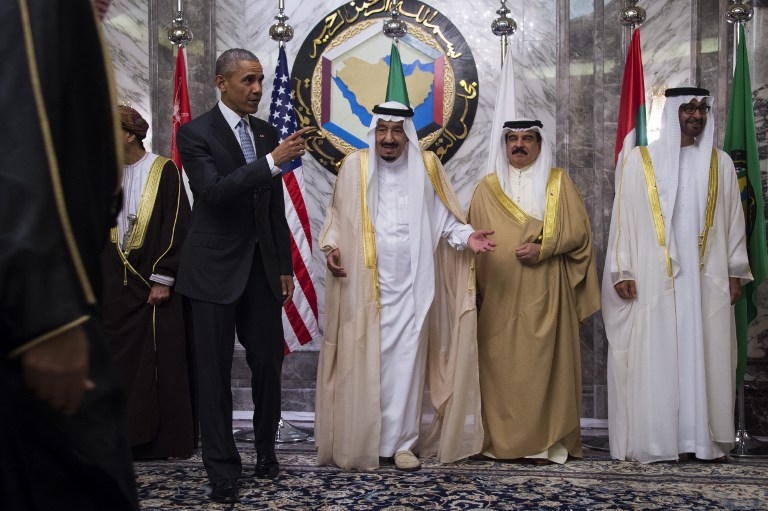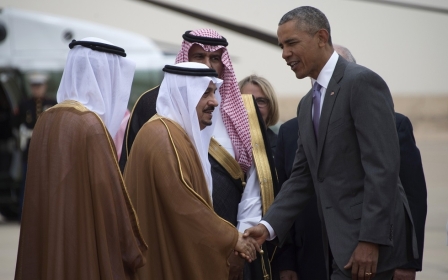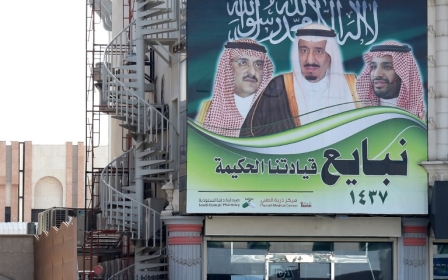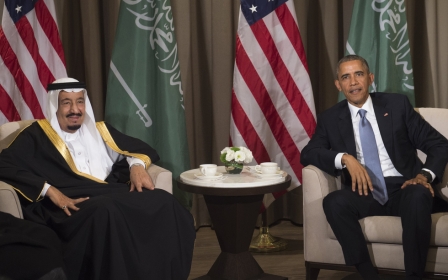Obama: US and Gulf united in fight to destroy IS

US President Barack Obama has said Washington and the Arab monarchies of the Gulf were united in their commitment to defeating the Islamic State group.
"We remain united in our fight to destroy ISIL," he said at the close of a summit meeting in the Saudi capital with the six-nation Gulf Cooperation Council.
Obama met Gulf leaders in Saudi Arabia on Thursday to push for an intensified campaign against IS group, despite strains in Gulf ties with Washington.
Making what is likely to be his final presidential visit to America's historic allies, Obama posed for a summit photo with the six regional leaders, including Saudi King Salman, before beginning four hours of scheduled meetings at a royal palace.
With nine months left of his term, the president is also again seeking to reassure his Sunni allies upset over American overtures to their regional Shia-majority rival, Iran.
The summit comes after Washington reported progress in recent months in the international military campaign against IS, who seized large parts of Iraq and Syria.
Saudi Arabia and other Gulf states are part of the US-led coalition which has been carrying out air strikes against IS.
In a bid to keep up the momentum against the militants, Defence Secretary Ashton Carter - in Riyadh with Obama - announced on Monday that the US would send more troops and Apache attack helicopters to Iraq.
Washington also wants to emphasise the reconstruction of cities taken back from IS.
On Wednesday, Carter pleaded for greater Gulf financial and political involvement in Iraq, which is battling an economic crisis as well as the militants.
Carter made the comments after meeting his Gulf Cooperation Council counterparts.
Sunni support 'critical'
"I encourage our GCC partners to do more, not only militarily as the Saudis, as the UAE have been doing.. .but also politically and economically," Carter said.
Sunni support for "multisectarian governance and reconstruction" in Shia-majority Iraq will be critical to ensuring the defeat of IS, the Pentagon chief said.
On the eve of the summit, US Secretary of State John Kerry was also in Riyadh, where he held talks with Deputy Crown Prince and Defence Minister Mohammed bin Salman.
Bahrain's King Hamad said in a statement that the summit "clearly reflects outstanding relations between the GCC countries and US".
He hoped the talks "would come up with results that would help handle the grave regional and international challenges, [and] boost regional peace and security."
But Gulf leaders are offended by Obama's perceived reluctance to get involved in the region's problems, and in particular his tilt towards Iran.
They worry that Iran will be emboldened to seek a still bigger role in the region after the lifting of international sanctions in January under a landmark nuclear deal with major powers led by the United States.
Prince Turki al-Faisal, the kingdom's former intelligence chief, told CNN that Obama's conduct and declarations have made Saudi Arabia realise that the relationship has changed.
"My personal view is that America has changed, you know, as much as we have changed here," he said.
"How far we can go with our dependence on America? How much can we rely on steadfastness from American leadership? What is it that makes for our joint benefits to come together? These are things that we have to recalibrate," the senior royal said.
He did not think the next president should be expected to return to "the yesteryear days when things were different".
Saudi Arabia has adopted a more assertive foreign policy under Salman and his powerful son Prince Mohammed and has led a military intervention in neighbouring Yemen for the past 13 months in support of its beleaguered government against Iran-backed Houthi rebels.
Military cooperation
Obama adviser Rob Malley said it is important to settle the regional conflicts in Yemen and Syria not only because of their devastating humanitarian consequences.
Referring to Yemen, he said "the countries that have been involved in that fight, as they reach a political solution, will be able to focus more of their activities against ISIL (Islamic State) and against al-Qaeda".
As Obama and the GCC meet, Yemen peace talks in Kuwait were again delayed, diplomats said, pending the arrival of rebel delegates.
"In Yemen, we are keen to find a solution," Saudi King Salman said, opening a GCC summit with Morocco on Wednesday night.
He expressed hope the Kuwait talks "would achieve positive progress".
Al-Qaeda and IS have exploited the conflict in Yemen to strengthen their presence in the country's south.
Since 2014, Saudi Arabia too has been attacked by IS, which claimed deadly bombings and shootings of minority Shias and members of the security forces.
Obama is expected to tell the Gulf monarchs that Washington will not ignore "destabilising acts" by Iran and the president has previously assured them that the US security commitment is "ironclad".
Saudi-US ties are founded on an exchange of oil for security.
The White House says military cooperation has accelerated with Gulf states worried about the Iranian threat since he hosted Gulf leaders at Camp David last May.
New MEE newsletter: Jerusalem Dispatch
Sign up to get the latest insights and analysis on Israel-Palestine, alongside Turkey Unpacked and other MEE newsletters
Middle East Eye delivers independent and unrivalled coverage and analysis of the Middle East, North Africa and beyond. To learn more about republishing this content and the associated fees, please fill out this form. More about MEE can be found here.




